Never Again
From Memory to Action – How to Act when Never Again is Now?
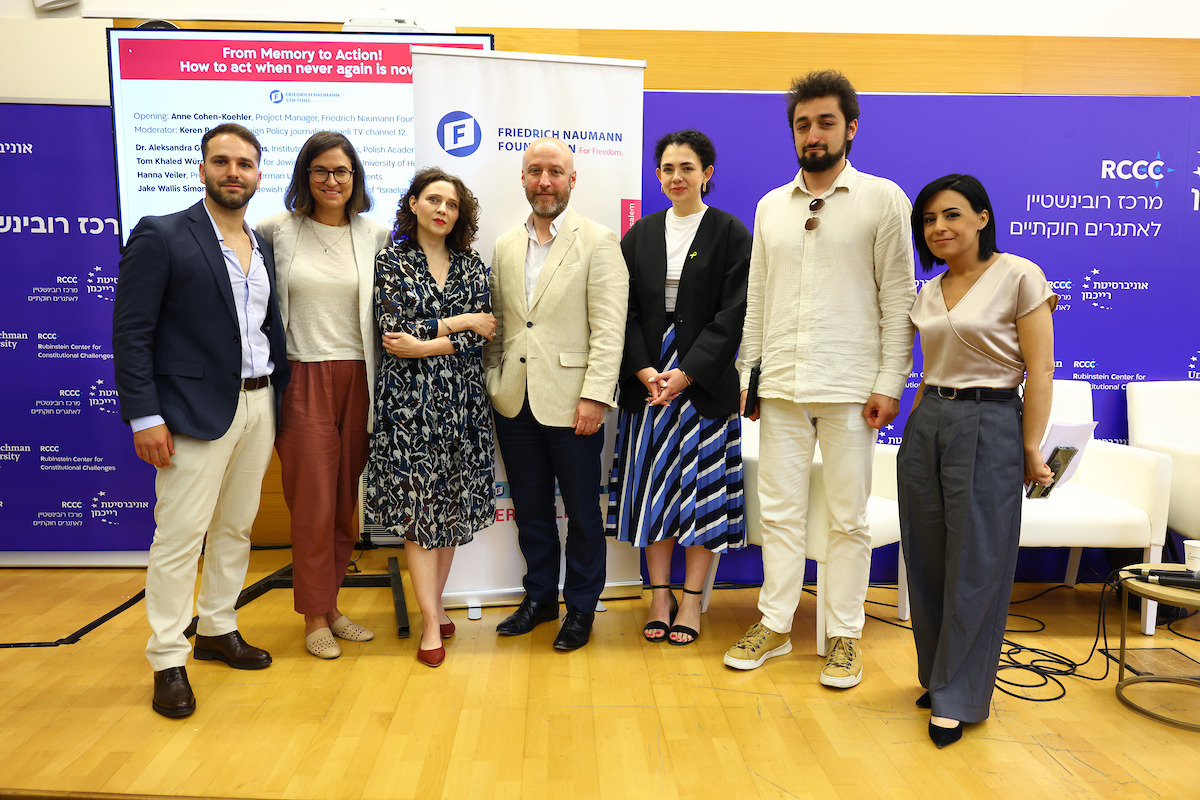
Since the October 7th Hamas terror attacks on Israel, the world has been witnessing a new dimension of antisemitism and anti-Israel sentiments, a dimension, which indeed makes us wonder, whether Never Again is not already here and now.
This was also one of the leading questions of a panel discussion, which FNF-Jerusalem in collaboration with its partner, The Rubinstein Center for Constitutional Challenges (RCCC) conducted in Mid-June at the Reichman University in Herzliya, and to which it invited leading thought leaders from Germany, Great Britain and Poland.
The Panel discussion was part of the annual conference of the RCCC, held in the memory of the late Prof Amnon Rubinstein, one of Israel’s outstanding liberal thinkers, constitutional fathers and liberal politicians, who was also a close friend and partner of the Friedrich Naumann Foundation for Freedom.
The panel actually was a continuation of a symposium, which FNF Jerusalem and RCCC convened beginning of May and which examined the immense impact collective traumas from the past had and still have on our societies and on our constitutional and international order after the second world and the Shoa.
While the symposium in May focused more on impact of the notion of Never Again, the discussion panel with guest speakers from Europe intended to discuss how we can live up to the legacy of Never Again in more practical and concrete terms, taking into consideration this new dimension of antisemitism which paradoxically (or not?) unleashed itself after one of the worst attacks on Jews after the holocaust.

Anne Cohen-Koehler, Israel Project Coordinator at the Friedrich Naumann Foundation for Freedom
The Jewish Diaspora after October 7th - Does History repeat itself?
One of the guest speakers from Germany was Hanna Veiler, president of the German Union of Jewish Students and vice president of European Union for Jewish Students. When asked how lives of Jews in Germany and Europe have changed since October 7th, Hanna pointed out that while Israelis were in war with Hamas, Jews in Europe, especially the young students among them, are fighting an army without a uniform, anti-Semites in all shades of society and especially at European campuses.
While antisemitism was on the rise also before October 7th and not a new experience for Jews in the diaspora, after October 7th, however, antisemitism has become bluntly open and virulently pushed by social media hate algorithms. Daily pro-Palestinian demonstrations on campuses, which often enough resonate hate speech against Jews and Israel, have made Jewish students feel very insecure at the campuses. Many Jewish students have experienced that friends and allies have abandoned them under the pressure of the public climate. Anti-Semitic and anti-Israeli sentiments are particularly strong among the young generation. According to Hanna this is due to the fact that they are drawing their information from their social media echo chambers, in which algorithm provide them with exactly the same information they already believe in. Apart from that, Hanna emphasized that antisemitism did not disappear with the defeat of the Nazi regime after the World War II, but lived on in the private sphere, disconnected from the new political correctness codes in the public sphere.
With the new anti-Israel sentiments and woke identity politics, many young people in Germany and Europe seemed to have found a way, sometimes even without noticing themselves, to channel their old and suppressed anti-Semitic beliefs. It still might not seem correct to call someone a “dirty Jew” but instead to call someone a “dirty Zionist” has become more and more common. A different wording but the same age old hate.
Asked if history is repeating itself, Hanna makes clear that while indeed young Jews in Europe feel threatened, often in a very concrete physical way by these developments, they are at the same time determined to not give in but to fight for their rights and against their discrimination in Europe. They are proud to be Jews and not willing to hide. At the same time they have learnt their lessons from the past and prepare themselves for all eventualities and the moment they will have no choice but to leave. It seems that the centrality of the State of Israel for Jews in the diaspora has never been as evident as it has been in these times.
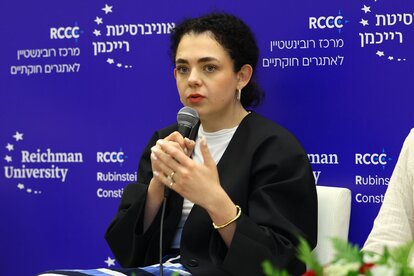
Hanna Veiler, president of the German Union of Jewish Students
To hate Jews has become fashionable
Asked about the special nature of recent mass demonstrations in London in support of Hamas and the Palestinians, Jake Wallis Simons, editor of the Jewish Chronicle and author of the recently published book "Israelophobia", emphasized that new coalitions have become evident. The radical right, the radical left often in conjunction with Islamic extremists and knitted together by fashionable identity politics find themselves united in their joint hate for someone they see responsible for the many evils in the world: the Jews, whom they blame for being colonizers, capitalists, elitist liberals, white supremacists (!!!), ruthless oppressors and war mongers. As it is fashionable especially among young people nowadays to hate colonialism, apparent white supremacists, it has become woke and fashionable to hate Jews, who for them are the epitome of all evils combined and therefore all means are also eligible to fight them. Therefore, October 7th is either denied in these circles or rather justified as legitimate resistance against this “ultimate villain”.
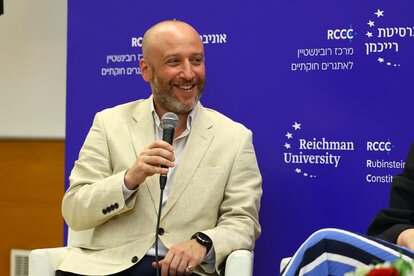
Jake Wallis Simons, Editor of the Jewish Chronicle and author of Israelophobia
We need to activate our legal systems to protect Jews
From Poland joined the discussion Dr. Aleksandra Gliszynska-Grabias, who just recently was appointed the Head of the Council of Advisors to the Minister of Justice and Prosecutor General in the area of counter acting hate crime and hate speech in Poland. For Aleksandra it is shocking to see that international legal protection systems, which rose from the ashes of the Holocaust, suddenly seem not to apply for Jews anymore. She made it clear that in these times the role of lawyers should be to make these laws work for Jews and assist them in protecting their rights and physical safety. In these efforts one also will have to take into the consideration the many new nuances of antisemitism virulent today.
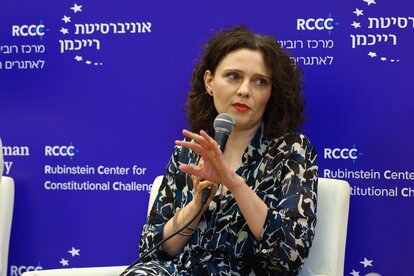
Dr. Aleksandra Gliszynska-Grabias, Institute of Law Studies, Polish Academy of Sciences
We need Pro-Palestinian Activism envisioning a peaceful solution
Guest speaker, Tom Khaled Würdemann, PhD student of Jewish Studies at the University of Heidelberg and educator and activist working with Muslim communities in Germany, gave a refreshing new angle on the situation of antisemitism and how to address it in the context of Muslim communities in Europe. Tom advocated for the need of new communication strategies when targeting these communities. He pointed out that he does not see by all means a lack of pro-Israeli activism in Germany but indeed a lack of pro-Palestinian activists envisioning a peaceful life in Israel/Palestine.
As a devoted Muslim, he sees himself actually as a Pro-Palestinian activist trying to make people understand that there are other viable solutions to end a conflict then wishing for the annihilation of the other side, e.g. in the case of the conflict of Ruanda, which ended with a peace treaty and not the annihilation of the perpetrator’s side.
Tom advocates for innovative communication strategies and methods when addressing Muslims on the issues of Jews, Israel and the Middle East conflicts. One thing he seeks is to overcome the dehumanization of Jews and Israelis among Muslims. For this matter he makes use of a method called paradoxical intervention. He exposes Muslim counterparts on purpose to “Zionist hatred” to actually humanize them. For that matter he is helping himself out with a famous poem written by Israel’s national poet, Chaim Nachman Bialik, called “City of Slaughter”, which draws upon the poet’s own painful experience of the horrific Kishinev pogroms. The poem is full of hatred towards the perpetrators and the longing for self-defense. The situation described and human emotions it arouses humanizes the “other side” and makes an identification possible.
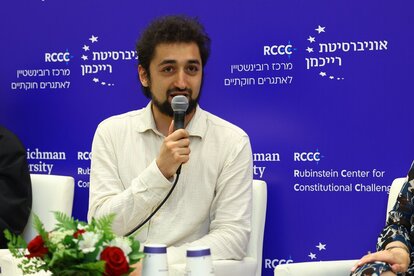
Tom Khaled Würdemann, Center for Jewish Studies at the University of Heidelberg
Thinking out of the box and collaborating across borders and across disciplines
The panel discussion demonstrated that more cross border and cross-disciplinary collaboration is needed as well as thinking out of the box with regard to our communication strategies and methods when combating antisemitism and addressing the Israeli-Palestinian conflict. FNF-Jerusalem is committed to enhance its partnerships and international networks in order to make the fight against anti-Semitism, hate speech and anti-democratic tendencies more efficient.
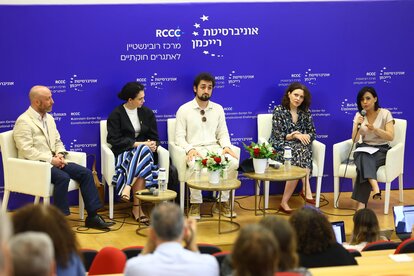
Our Panel, lead by Keren Bezalel, foreign policy journalist of TV Channel 12
